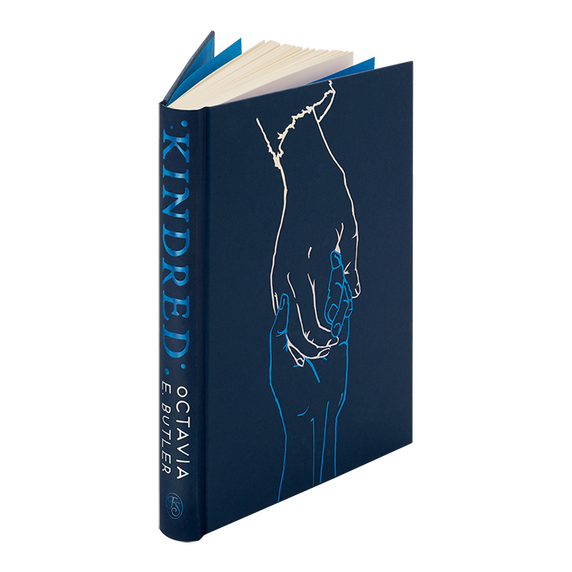
The past becomes a deadly leash in Octavia E. Butler’s remarkable science-fiction thriller Kindred. This special Folio Society edition features work by award-winning artist James E. Ransome.
Illustrated by Anna and Elena Balbusso
Introduced by Margaret Atwood
‘Science fiction has monsters and spaceships; speculative fiction could really happen.’ Margaret Atwood’s chilling cautionary tale is illustrated by the Balbusso sisters.
There’s a lot that doesn’t bear thinking about. Thinking can hurt your chances, and I intend to last.
Narrator Offred is a Handmaid serving the Republic of Gilead – formerly part of the United States. Her role is to bear children for her Commander, whose wife is unable to conceive. If Offred refuses, she will be hanged or sent to die of radiation sickness in the Colonies. Yet she can remember a different life, when she had a home, a husband, and – most agonisingly – her own child.
Bound in cloth blocked with a design by the artists
Set in Scala
336 pages
Frontispiece and 6 colour illustrations
Plain slipcase
9˝ x 6¼˝
The Handmaid’s Tale portrays a chilling dystopia, with its military hierarchy of Angels, Guardians and Eyes, and its Birthmobiles, Econowives, Prayvaganzas and Salvagings (executions). Offred makes frequent references to the world she once knew and the freedom she took for granted – having her own bank account, wearing her hair uncovered, even something as simple as using nail varnish. Atwood skilfully dramatises the contrast between the grotesque strangeness of Gilead and ‘ordinary’ life going on elsewhere, as when Offred and a companion encounter a group of tourists from Japan. Forbidden to take pictures, the tourists ask, through an interpreter, if the women are happy. Both fascinated and repelled by the Japanese women’s ‘Westernized’ clothing, Offred replies that they are very happy. ‘I have to say something. What else can I say?’
Asked whether her book could be classed as science fiction, Atwood replied: ‘Science fiction has monsters and spaceships; speculative fiction could really happen.’ First published in 1986, The Handmaid’s Tale was inspired by contemporary Western fears about falling birth-rates, as well as by religious fundamentalism both in the West and East. It was a critical and popular success, launching its Canadian author on the international stage. It won the Governor General’s Award for Fiction, one of Canada’s most prestigious literary prizes, and the inaugural Arthur C. Clarke Award for science fiction, as well as being shortlisted for the Booker Prize. Anna and Elena Balbusso’s stunning illustrations skilfully highlight the regimented and hierarchical nature of society in Gilead.
‘We really appreciate that Folio understood that this was a perfect book for us. For a long time we hoped for a book like this and we loved the challenge. The theme of a woman’s body appealed to our sensibility. The story gave us the opportunity to create strong graphic images.
‘To give a visionary interpretation and to create the right atmosphere for the story, we chose a futurist tone with accentuated perspectives and strong light. We used few colours and with a prevalence of red, black and white. Futurism, Russian Constructivism and fascist-period design were our references.
‘It was important to have a certain freedom of interpretation to better express what the writing suggests. It was very difficult to choose scenes and we gave up on many interesting options. Instead we tried to focus our attention on the woman’s body. Some situations in the story are very complex and we preferred to leave the interpretation of those to the readers of this exceptional text.’
Anna and Elena Balbusso are an internationally recognised team of Italian artists. Together they have received more than 70 international awards, including the New York Society of Illustrators’ Steven Dohanos Award and the Los Angeles Society of Illustrators’ Joseph Morgan Henninger Award. For three consecutive years (2011–13) they were awarded the Gold Medal in the book category of the Society of Illustrators Awards: in 2012 for their work on the Folio Society edition of The Handmaid’s Tale. In 2013 they won the Book Illustration category at the V&A Illustration Awards for their work on the Folio edition of Pushkin’s Eugene Onegin (2012). They have also illustrated The Song of Roland (2010), First Love (2010), Pride and Prejudice (2013), The Queen of Spades and Other Stories (2014), Twelfth Night (2016) and Atlas Shrugged (2018) for The Folio Society.
